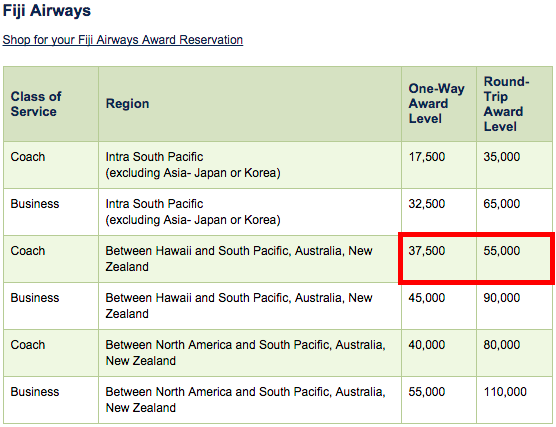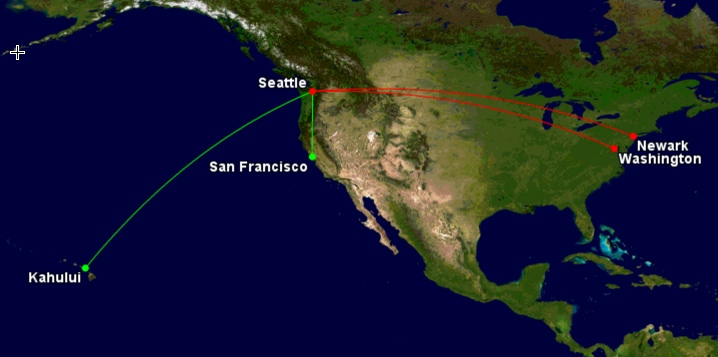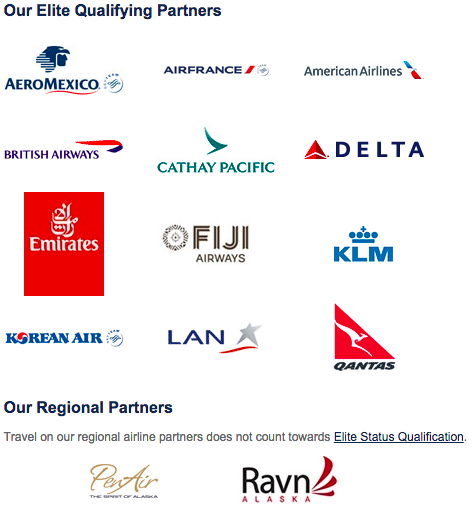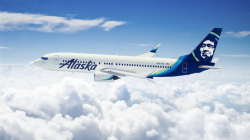Chauncey emailed me last weekend with a question about Alaska Airlines routing rules. Not all their rules are well published on Alaska’s website, and he needed to get to Europe with a combination of KLM and Air France flights.
Fortunately, Alaska is known to have flexible rules for booking award travel. They also have a reasonably priced award chart (although they aren’t always the cheapest), and they make it relatively inexpensive to buy more miles (at least if you buy miles while ticketing another flight). Ultimately, I think miles are valuable if you can do something fun with them on a regular basis, not if you have to wait for that opportunity once in a blue moon to snag an amazing deal. Even United Airlines qualifies under these criteria despite charging much more for awards on partner airlines.
Rule #1: One Partner Per Ticket
The most important rule is that you can only book one partner airline per award ticket. This is clearly evident from Alaska’s award charts: even for travel to the same geographic region, there are different prices depending on if you fly American, Delta, Cathay Pacific, etc. So you generally can’t combine more than one airline on the same itinerary. There are, however, some exceptions.
You can add any number of flights operated by Alaska Airlines and Horizon Air. That can get you from your home airport to your international gateway.
Here’s an example that works: You find great award space to Hong Kong on Cathay Pacific from Los Angeles. You could fly from Newark to Seattle on Alaska Airlines (service from JFK will begin later this year), and continue on Alaska Airlines from Seattle down to LAX. Then connect to Cathay Pacific’s excellent first class service to Hong Kong.
Here’s an example that doesn’t work: You can’t fly on American Airlines’ non-stop transcon service from JFK to LAX and then switch to Cathay Pacific. That would mean connecting from one partner to another. You’d get charged separately for one domestic award and one award to Hong Kong.
What some people don’t realize is that the partnership is with the loyalty program itself, not the airline. Air France and KLM share the Flying Blue loyalty program, so you could conceivably book one award ticket that includes segments on Alaska Airlines, Air France, and KLM.
Finally, nothing stops you from booking two one-way awards on different airlines. You could book British Airways on the outbound to Europe and Air France/KLM on the return.
Rule #2: One-Way Awards Are Permitted
Yes, you should have caught that. Alaska Airlines permits one-way award travel, and in almost all cases the price is just half as many miles as a round-trip ticket. There are a few exceptions where you’ll pay more for one-way travel:
- Pay the round-trip price on any award on Delta Air Lines (even though Delta now offers one-way awards at half-price to its own SkyMiles members).
- Pay the round-trip price on any award on Korean Air (why they want to copy Delta is beyond me)
- Pay slightly more for coach awards on Air Fiji between Hawaii and New Zealand/Australia/South Pacific (but any other award is normal, so go figure)
Again, the “one partner” rule is not quite fixed in stone. You can combine Delta or Korean Air with another partner and split the difference. As an example, you could fly Delta one-way to London and only pay half the round-trip price, then pay the standard one-way price to return on British Airways. This means the only time you must pay more for flying one-way is on that stupid Fiji Airways flight in coach. I can’t think of a better reason to insist on business class. 😉

But otherwise, if you want to travel on multiple partners, you should generally book separate outbound and return tickets. This is also a good strategy if you can only find award space in one direction right now and are hoping more award space will appear later. Keep in mind, however, that any changes or cancellations will require two fees if you don’t have elite status.
Rule #3: At Least One Stopover on Most Tickets
Yes, Alaska Airlines allows stopovers on award tickets, and it’s surprisingly generous. American Airlines took away stopovers, but they at least had to be on international itineraries in the past. United still allows stopovers, but only on round-trip tickets.
Alaska, however, allows one stopover for one-way travel and two stopovers for round-trip travel. If you’re flying round-trip, you can also book a double open jaw (imagine flying from the U.S. to Europe, and then returning from a different city in Europe to a different city in the U.S.).

These stopover rules apply on domestic itineraries, as well, as long as you’re flying on Alaska Airlines only. So you can fly from Washington, DC, to Maui with a stopover in Seattle. Amol has provided some great examples of combining multiple one-way awards with stopovers to effectively create round-trip tickets while using fewer miles.
The Fees
Alaska generally doesn’t add fuel surcharges to its award tickets, so you don’t have to worry about that. But you’ll still have to pay those dreaded fees on British Airways — they seem to make a requirement of being their partner no matter who you fly.
There are also no close-in booking fees, though awards cannot be placed on hold. Find the award you want and book it. You can cancel without penalty in the first 24 hours.
There are a few other fees you might get stuck with. Those who have MVP Gold or MVP Gold 75K elite status won’t pay any fees to book, change, or cancel award tickets. You can just skip this part. Keep in mind that any fees you do pay are determined by the elite status of the person whose miles were used to book the award, not the elite status of the passenger. General members and those with just MVP status will face up to three different fees:
$15 telephone reservations fee — If you need to call to book your award, you’ll pay $15 per ticket. Awards involving travel on Cathay Pacific, LAN, and any award with stopovers cannot be booked online. You might be able to convince the agent to waive this fee if you had no choice. The number is 1-800-252-7522, and they’re open from 5 AM to midnight (Pacific Time) every day.
$12.50 partner award ticket fee — Alaska charges $12.50 per person each way for award travel on partner airlines. (This is each direction of travel, not per segment.) If you fly round-trip, you’ll be paying $25 per person.
$125 change or cancellation fee — Alaska waives this fee if you change or cancel your award more than 60 days before departure, which is better than most airlines. So-called “refundable awards,” which are only available for travel on Alaska, can also be cancelled without penalty at any time.






